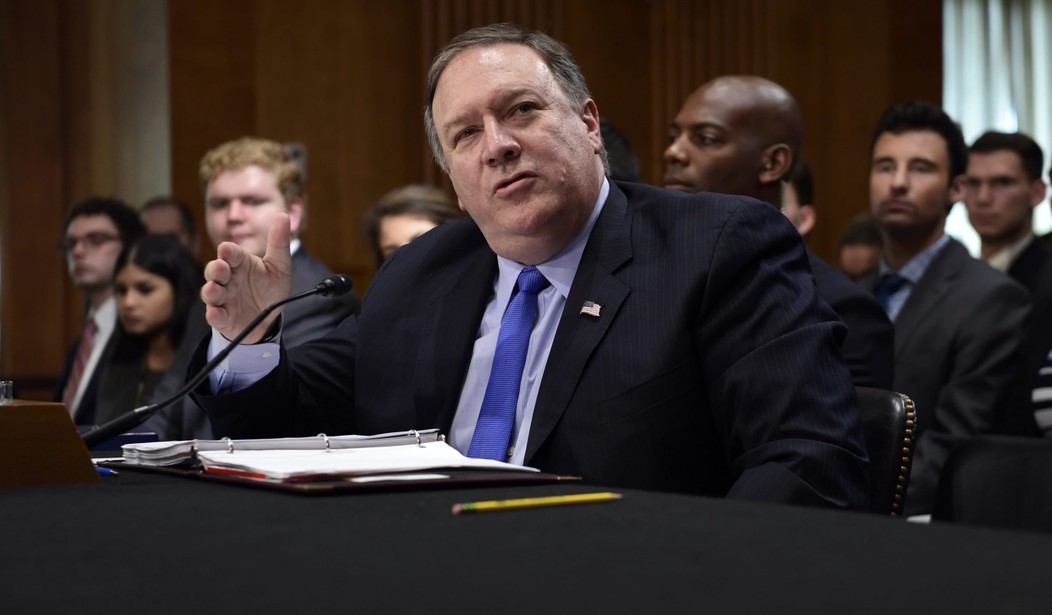WASHINGTON — Secretary of State Mike Pompeo told senators Wednesday that he believes North Korea understands how the U.S. defines denuclearization, but wouldn’t say whether Kim Jong-un’s regime is still developing nuclear weapons.
Pompeo’s testy appearance before the Senate Foreign Relations Committee opened with questions on Russia, and he dodged lawmakers attempts to pry details about what he was told transpired in the private two-hour meeting between President Trump and Russian President Vladimir Putin.
Ranking Member Bob Menendez (D-N.J.) asked if Trump had shared the meeting details with Pompeo, who replied that he believes he has a “pretty complete understanding” from conversations with the president and the Russian foreign minister afterward.
Pompeo said he had not talked to the translator who was in the room with Trump and Putin nor looked at her notes. He also said he would commit to working with senators on a new sanctions bill that Menendez is crafting with Sen. Lindsey Graham (R-S.C.).
On the North Korea front, Menendez asked Pompeo if the U.S. goal is no less than “the dismantlement, removal of all nuclear weapons, facilities, technology, and material from North Korea.”
“I’m engaged in a complex negotiation with the North Koreans. So I don’t intend, in this public setting, to share the details of every conversation that took place in those. But I will attempt to answer your questions with out disclosing the contents of the negotiation,” Pompeo replied. “I am very confident that the North Korean’s understand our definition of denuclearization, and a very broad one.”
“They understand it, but they didn’t agree. Did they agree to end the production and enrichment of uranium and plutonium for military programs?” Menendez asked, pressing the secretary for a yes or no answer.
“They’ve agreed to denuclearize fully,” Pompeo ultimately answered. “Yes, Senator.”
Menendez has introduced along with Sen. Cory Gardner (R-Colo.) sanctions oversight legislation. Gardner asked Pompeo if he still believed, as he had told the committee in the past, that North Korea “is the most urgent security threat that the United States faces.”
“Maybe it’s still the priority, I don’t know how to think about it, but I’m optimistic that we’re headed in a path that’s the right direction, and we just got to get the rate of change right,” Pompeo said.
“The complete, verifiable, irreversible denuclearization, why was it not in the communique following the Singapore summit?” Gardner asked.
“Yeah, I’d rather not talk about the course of the negotiations and how we arrived at the language that we did,” Pompeo replied.
“Is North Korea still moving or making advancements, undertaking a nuclear program?” Gardner continued.
Pompeo said he’d “prefer not to” answer the question in an open setting.
“We’d love to provide that setting for you soon,” chimed in Chairman Bob Corker (R-Tenn.).
Gardner stressed that it’s a “very important point of information that we get though, to know whether or not North Korea is either overtly, covertly, however they are doing it, making advancements in their nuclear program or still continuing a measure of their nuclear program.” He asked how many sanction designation investigations, as required by law for determining whether additional people should fall under sanctions, were currently underway; Pompeo said he didn’t know.
Pompeo told Sen. Ed Markey (D-Mass.) that North Korea continues to produce fissile material for constructing nuclear weapons. He would not answer whether the Kim regime is continuing to pursue submarine-launched ballistic missiles.
Markey asked if North Korea has committed to destroying their stockpiles of chemical and biological weapons.
“We have made very clear that the entirety of the North Korean CBW program is contained in the U.S. understanding of denuclearization and I am confident that the North Koreans understand clearly America’s definition and they have agreed to denuclearize,” Pompeo said.
Asked whether the U.S. has an inventory of North Korea’s warheads, materials and facilities, the secretary of State said he couldn’t answer that in the open hearing.
Menendez noted that senators “haven’t still had a briefing on North Korea in a classified setting, nearly two months afterwards.”
“So what I took away is that as it relates to North Korea, we have no agreements on anything. The best I can glean is that they understand what we mean by denuclearization but they have not agreed to that definition,” the senator said. “I really don’t believe, Mr. Secretary, you know what happened during the president’s two-plus hour conversation with President Putin, and I really don’t know much more about the summit after sitting here for three hours than I did before.”
After some back-and-forth with the senator, Pompeo accused Menendez of making “a political soliloquy.”
“You want to talk about politics? If President Obama did what President Trump did in Helsinki, I’d be peeling you off the Capitol ceiling. Please,” Menendez shot back, later adding, “I believe that it is rightful for the members of this committee, even if its in a classified setting, to speak to the translator or to see her notes because that’s the only way we will know what truly conspired.”
“Would you like to give any response?” Corker asked Pompeo.
“Not a word,” the secretary of State replied.









Join the conversation as a VIP Member